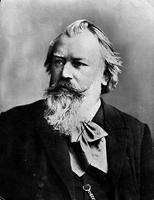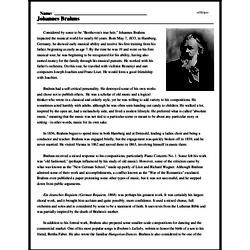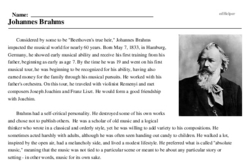Johannes Brahms
Considered by some to be "Beethoven's true heir," Johannes Brahms impacted the musical world for nearly 60 years. Born May 7, 1833, in Hamburg, Germany, he showed early musical ability and receive his first training from his father, beginning as early as age 7. By the time he was 19 and went on his first musical tour, he was beginning to be recognized for his ability, having also earned money for the family through his musical pursuits. He worked with his father's orchestra. On this tour, he traveled with violinist Remenyi and met composers Joseph Joachim and Franz Liszt. He would form a good friendship with Joachim.
Brahms had a self-critical personality. He destroyed some of his own works and chose not to publish others. He was a scholar of old music and a logical thinker who wrote in a classical and orderly style, yet he was willing to add variety to his compositions. He sometimes acted harshly with adults, although he was often seen handing out candy to children. He walked a lot, inspired by the open air, had a melancholy side, and lived a modest lifestyle. He preferred what is called "absolute music," meaning that the music was not tied to a particular scene or meant to be about any particular story or setting - in other words, music for its own sake.
In 1856, Brahms began to spend time in both Hamburg and at Detmold, leading a ladies choir and being a conductor and teacher. Brahms was engaged briefly, but the engagement was quickly broken off in 1859, and he never married. He visited Vienna in 1862 and moved there in 1863, involving himself in music there.




